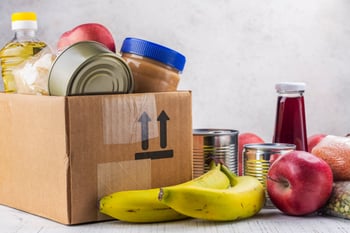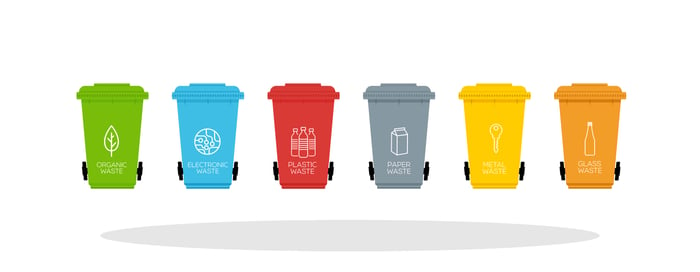Time for a rethink? How UK restaurants can serve up savings for both businesses and our climate

It’s been a tough few years for anyone running UK restaurants. Businesses that survived Covid-19 lockdowns saw customers initially slow to return, impacting their ability to bounce back.
Then, when summer arrived and footfall finally reached a peak, staffing became a major issue across the hospitality industry, with many businesses forced to limit opening hours at what should have been one their busiest periods.
And with energy price increases on the horizon at times like these, every penny counts. But when you’re pedalling hard just to stand still, it’s sometimes easy to overlook areas where you can make meaningful change, such as waste disposal. Are you keeping your costs in check and helping to protect the world we live in? Is it time to do waste management differently?
Is it time to control the costs of your waste?
Pre-Covid figures show that, with inflation taken into account, UK restaurants alone are wasting food at a rate that costs them a staggering £855 million a year.* Add in pubs, and you can put another £411 million on that figure.* That total equates to 320 million meals thrown away by the trade annually.*

As well as the financial and social costs of wasted food, there’s an environmental one too: according to the UN, global food waste accounts for around 8% of all greenhouse gas emissions.* If food waste was a country, only the USA and China would produce more carbon.
Clearly, no restaurant actively chooses to be a part of such environmental and financial destruction. So what can be done about it? Change starts by focusing on the factors you can control.
For recycling and waste, there are significant benefits to thinking ahead and limiting the amount you send to landfill as you’re likely to reduce business waste and cut your carbon footprint at the same time. Nowhere is this more true than with leftover food waste.
It’s easy to act on food waste
As the statistics above prove, there are savings to be made from carefully considering the type and volume as well as the frequency of food and ingredients a restaurant buys so that there’s less potential for wasting food, especially given the rapidly escalating costs UK restaurants currently face. Then there’s the creativity in the kitchen to make full use of whatever’s available – from root to tip and nose to tail – before it becomes unusable. Once food reaches diners, it helps to get the portion size and content right to avoid plate waste. Increasingly, restaurants are recording what’s returned from the dining room in order to correct any excess.

Inevitably, even the most thorough planners will still have food left unused from time to time. That’s where food banks and redistributor can help, gratefully passing on your excess to those who need it and making your own personal dent in those 320 million meals thrown away by hospitality and food services each year. You could even consider composting your leftover fruit and vegetable waste, generating nutrient-rich material to grow your own produce in.
Even once all the options for reduction and reuse are exhausted, there are still positive, environmentally friendly ways of dealing with leftover food, such as our food waste recycling services.
Protect our planet
Nobody likes to have mountains of exposed food waste rotting on their restaurant premises. It looks and smells bad, attracts vermin, releases hazardous gases and pollutes the environment. You need a reliable service to avoid the potential negative impact this can have on your business. At Hills Waste Solutions, we provide our customers with the most appropriate, recycling bin for their needs. We accept all types of food and drink waste – from raw production waste to cooked plate scraps – and send your leftover food to do good, turning it into renewable energy for the National Grid and bio-fertiliser for agricultural use.

And we understand that your business runs to its own schedule, which is why our reliable and flexible waste collection service adapts to your needs. Maybe you’re busier at weekends or on weekdays, or in summer rather than winter. Whatever your reality, we let you amend the frequency of our visits, fuss-free.
Why stop there? Recycle even more with Hills
The same goes for all our recycling and waste management services. We make it easy for you to run an eco-friendly recycling programme by collecting both dry mixed recycling and glass. Dry mixed covers everything from cardboard and cans to paper and plastic pots, all of which can be disposed of conveniently in the same recycling bin.
Glass waste is one of the most environmentally friendly materials to recycle of all, as it can be turned back into the same product type time and time again without any loss of quality. We collect all glass bottles and jars for recycling so that you can reduce your waste and keep glass out of landfill.
Once you’ve separated out all these (often heavy) materials, you’ll be left with a slimline requirement for general waste disposal – which means less going to landfill. Of course, as part of our commitment to total waste management, Hills will collect your general waste too, and even that will be put to good use thanks to state-of-the-art energy-from-waste facilities that turns waste into fuel for renewable energy plants.
It starts with a small change. Make the first move
So don’t accept the “Just bin it” approach to waste management. We encourage you to be aware of the volume of waste you’re disposing of and to ask your collection provider direct questions about what happens to your waste when it leaves you. Where is it sent, how much gets recycled and how much is simply dumped in landfill? If the answers aren’t helping you to control your costs or hit your environmental targets, then maybe it’s time to consider a better option.
Reducing and recycling your waste is easier, more eco friendly and more cost effective than you may think. To find out more about our extensive experience working in partnership with the hospitality industry to manage waste and recycling services, and how our hassle-free, value-for-money solutions can help your business, visit our dedicated page to hospitality and tourism waste management and get in touch with us today.
References*
